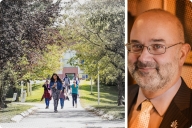You have /5 articles left.
Sign up for a free account or log in.
On Tuesday Arizona State University’s School of Human Evolution & Social Change officially opened for learning. It’s the outcome of a reorganization of the institution’s anthropology department that’s been almost two years in the making. While many faculty members at the university are pleased with prospects for interdisciplinary collaboration that come along with the change, others are concerned that anthropology as a discipline is getting the short end of the evolutionary stick.
"Our new [school] breaks down the traditional disciplines of anthropology and re-directs the energies of the school to problems faced by modern societies," said Michael Crow, Arizona State’s president, in a statement. "Problems like the spread of disease, environmental concerns or unhealthy growth are problems encountered throughout history. We feel we can make significant contributions to the challenges of today by better understanding how they played out in the past."
Several non-anthropology faculty members have been hired to achieve that mission. In interviews Tuesday many anthropology professors said they were excited to begin working with Jane Buikstra, a distinguished bioarchaeologist from the University of New Mexico, as well as Charles Perrings, a well-known professor of environmental economics and environmental management from the University of York. The Arizona State sociologists Bob Bolin, Ed Hackett and Sharon Harlan have also officially joined the school.
Almost 50 faculty members now make up the school’s roster, “with more coming in the near future,” said Skip Derra, a university spokesman. The anthropology department didn't even have 30 faculty members a year ago.
The reorganization at Arizona State is one of the more ambitious in the discipline in some time. Many universities in recent years have dealt with fights between anthropologists more oriented toward culture and those more oriented toward physical sciences, and some of those fights have led to departmental splits. Arizona State, in contrast, is adding to the field -- and taking anthropology out of the name.
According to Sander van der Leeuw, director of the new school, the interdisciplinary team will focus not only on the past and present, but also on the future functioning of humans and human societies. “We are integrating archaeology and anthropology in a very long term transdisciplinary approach that will contribute to our understanding of the future,” he said in a statement.
That integration is a source of bewilderment for some involved in the anthropology field, including at least one Arizona State faculty member who’s now with the new school.
A source affiliated with the American Anthropological Association, who asked not to be identified, argued Tuesday that David Young, dean of arts and sciences at Arizona State, has “turned the anthropology department upside down.”
“I don’t get the impression that he’s doing this for academic reasons,” said the source. “These interdisciplinary ideas work fine if they come from the bottom up, but this was imposed from the top down. This might not make for a very happy situation.”
Linda Wolfe, the chair of anthropology at East Carolina University, who holds the biological seat on the anthropology association's Executive Board, cautioned that winning grants may pose a challenge for some anthropology scholars at Arizona State’s restructured school. “Grants, like those at NSF -- there are a few that can be awarded to interdisciplinary programs, but most of them are for mainline disciplines,” she said Tuesday.
Upon reviewing the mission of the school, Wolfe added: “This kind of program isn’t going to strengthen anthropology, it’s going to destroy anthropology.… I think their rankings will go down because it’s not an anthropology program anymore, it’s an interdisciplinary mish-mash.”
During a full day of launching the new school, van der Leeuw, the director, could not be reached for comment on the specific issues Wolfe raised.
But faculty members like Keith Kintigh, an archaeology professor, trumpeted ASU’s “renewed anthropological commitment brought about by the reorganization.”
“This has never been done before -- all these new hires -- this is huge,” said Kintigh. “Regarding funding, I think that support generally for anthropology programs is static -- interdisciplinary programs seem to be getting more grants, although not always.”
While he wishes that “anthropology” could have been a part of the school’s new name, Kintigh doesn’t view the issue as “problematic.” According to Derra, the new name was selected by Crow, with advice from faculty members.
Since the reorganization was announced approximately 20 months ago, six anthropology staff have retired “at normal retirement times,” according to Derra, and one left for a better position, said Kintigh.
Elizabeth Brumfiel, president of the American Anthropological Association and professor of anthropology at Northwestern University, labeled the reorganization “a great initiative,” but said it shouldn’t be seen as the beginning of a nationwide shift in the way anthropology is taught. “I don’t think it signifies a reorientation of anthropology because anthropology has a longstanding tradition of addressing issues of contemporary relevance, such as disease,” she said.
Student perspectives on the new approach were difficult to come by on Tuesday, but Derra said that 413 students are enrolled in the program, compared to 391 last year. Additionally, 32 more courses are being offered this fall over last spring.
Jason J. González, a graduate student in anthropology at Southern Illinois University at Carbondale, and the student representative on the American Anthropological Association board, said he thinks the Arizona State program has the potential of being a good thing for students. “It sounds like it would be a great program to be a part of in many ways,” he said. “But also I don't think I have missed out on anything at my own school. Similar opportunities of taking classes and learning from professors outside of my discipline and outside of anthropology already exist.”








